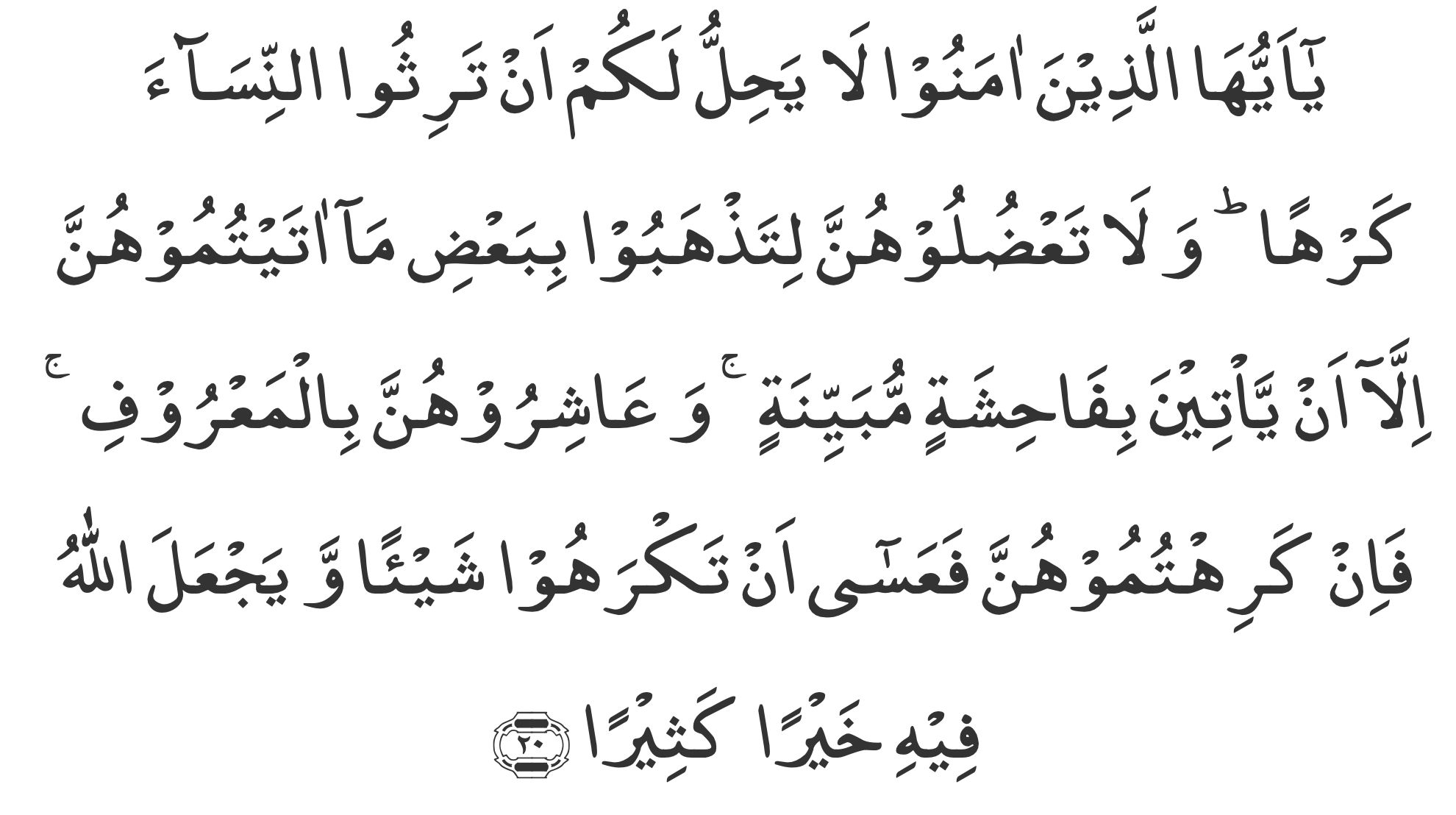 (zuhd–devoutness) by giving various examples of disinclination with worldly life in a Friday sermon. With reference to the relationship between husband and wife, Huzoore Anwer said:
(zuhd–devoutness) by giving various examples of disinclination with worldly life in a Friday sermon. With reference to the relationship between husband and wife, Huzoore Anwer said:Hazrat Ameerul Momineen elucidated the real meaning of  (zuhd–devoutness) by giving various examples of disinclination with worldly life in a Friday sermon. With reference to the relationship between husband and wife, Huzoore Anwer said:
(zuhd–devoutness) by giving various examples of disinclination with worldly life in a Friday sermon. With reference to the relationship between husband and wife, Huzoore Anwer said:
“Hazrat Wahib narrates that the Holy Prophet (peace and blessings of Allah be on him) made a bond of brotherhood between Hazrat Salman and Hazrat Abu Darda (may Allah be pleased with them both). Hazrat Salman paid a visit to Hazrat Abu Darda and found Abu Darda's wife wearing work clothes and looking unkempt and asked her why she was in that state. She replied, ‘Your brother Abu Darda does not need this world and is detached from it.’ In the meantime Abu Darda came and prepared a meal for Hazrat Salman and invited him to eat while he himself was fasting. Salman said, ‘I am not going to eat unless you eat.’ So, Abu Darda broke his fast (it must have been an optional fast). When night fell (a part of the night had passed), Abu Darda got up to offer Salat, Salman told him not to awaken yet and Abu Darda went back to sleep. After sometime Abu Darda again got up, and Salman told him to go back to sleep. When it was the last hours of the night, Salman told him to get up, and both of them offered Salat. Salman said: ‘O’ Abu Darda', your Lord has a right on you, your soul has a right on you, and your family has a right on you; so you should give the rights of all those who have a right on you.’ Later, Abu Darda went to the Prophet and narrated the whole story. The Prophet said, ‘Salman has spoken the truth.’ (Sahih Bukhari, Kitabu Sawm, Babu Man aqsama ‘ala akheehi leyuftira fi-tatawu’e)
“Zuhd does not signify forgetting the worldly rights of the wife and children that Allah the Exalted has given or to give up work. Worldly work should be carried out in parallel side by side but should not be the only objective. Everyone’s rights should be given.”
(Friday sermon delivered on 7 May 2004 at Baitul Futuh, London Published in Al Fazl International 21 May 2004)
Addressing ladies with reference to the same subject, Hazrat Khalifatul Masih V (may Allah be his Helper) advised:
“In order to establish all aspects of freedom of women, Islam gives women a right which is an amalgamation of many rights. Allah the Exalted states:

“‘O ye who believe! it is not lawful for you to inherit women against their will; nor should you detain them wrongfully that you may take away part of that which you have given them, except that they be guilty of a flagrant evil; and consort with them in kindness; and if you dislike them, it may be that you dislike a thing wherein Allah has placed much good.’ (4:20)
“This is a right given to a woman in instances where for example, a husband does not treat his wife well, dislikes her, does not fulfil his responsibilities to her, but does not divorce her either because he wishes to benefit from her wealth or pushes the poor woman to a state where she reaches her deathbed whilst he schemes to benefit from her property after her death.
“Sometimes men present untrue statements about women before the Qadha Board and try to damage their reputation, hoping to avoid paying due rights. In these countries it so happens that some men take their wives to court to seize half of their property although Allah the Exalted has strictly forbidden this.
“Sometimes relatives do not let a widow re-marry so that her husband’s property remains at their disposal. Such episodes happen even today and numerous such complaints are received. The Holy Qur’an drew attention of men 1500 years ago to avoid such sins so that the rights of women were safeguarded.
“Sometimes relatives force women to marry a certain person amongst their relatives, so that the property of her late husband stays within the family. As I have said earlier, husbands snatch the wife’s property by unfair means. In these countries even legal measures are taken in this respect and at times if the husband dies, his relatives continue with the process. At other times it is demanded that the gifts exchanged at the time of marriage are returned. Such demands of return of gifts is a common complaint in matrimonial grievances. The Holy Qur’an establishes women’s rights and goes on to safeguard these rights like no other religion. Allah the Exalted states that all these instances are forbidden and are tantamount to depriving women of their rights.
“As I said earlier, women have the right to re-marry, with their choice, after divorce or death of the husband. As the marriage ceremony of nikah cannot be officiated without a wali (guardian) for the woman, in instances where impediments are created, a woman can request the Khalifa of the time to intervene. If the case is genuine then the Khalifa of the time can himself become the wali, or appoint a wali or a wakeel.
“Establishing the rights of women, Allah the Exalted states in the verse,

“‘…and consort with them in kindness…’ (4:20). Treat them well, do not look for excuses to be malicious and unkind to them, do not desire their property or whatever you have given them. The Holy Prophet (peace and blessings of Allah be on him) said:

“‘The best of you is he who is the best to his wife.’ Then he said, ‘and I am the best to my wives.’ (Sunan Ibne Majah, Kitabul Nikah, Babu Husne mu’asharate-nisa’, Hadith number 1977)
“Thus, by his own excellent and blessed model, the Holy Prophet (peace and blessings of Allah be on him) further drew the attention of men towards women’s rights.
“Let it be clear that the use of the term ‘flagrant evil’ in the aforementioned verse does not give men the right to confiscate women’s property… It needs to be understood that the use of the phrase ‘flagrant evil’ is not a licence for men to get their hands on their wife’s property. Rather, it is related to living life with kindness shown to wives and honouring their rights… Do not withhold the rights she has over you. Therefore, Allah the Exalted has admonished men who torment women or threaten with divorce over trivial slip-ups by upholding their rights in this regard as well.”
Huzoore Anwer added: “Men are also advised to overlook women’s mistakes and weaknesses. Men are also encouraged to treat them gently and with kindness. This kindness should not be limited as a reward for something that pleases them; rather, they have to be kind even if they do not like them. This is how Islam has set the standard of women’s right at the highest level.
“Hazrat Abu Huraira relates that the Holy Prophet (peace and blessings of Allah be on him) said that when a person fulfils his needs for which he has had to travel, with consideration for his family he should return home soon. (Sahih Bukhari, Kitabul Jehad wa-sayr, Babu Sur’ah fi-sayr, Hadith number 3001)
“The family of a married man indeed are his wife and children. Today we see that in some households women are left all alone. When young women come to these countries after marriage, they do not have any acquaintance here. They are confined to their homes all day. Given the wintry climate of these [Western] countries, at times they also suffer from depression. Meanwhile the men stay outside with their friends after work chatting away. The Holy Prophet (peace and blessings of Allah be on him) also established this right of women by advising men to give women their due right, give relatives their due right and give children their due right. He strongly disliked the idea of [men] wasting time in idle talk, leaving the wife behind at home.”
(Address delivered on 26 July 2008 at Jalsa Salana UK. Published in Al Fazl International 15 April 2011)